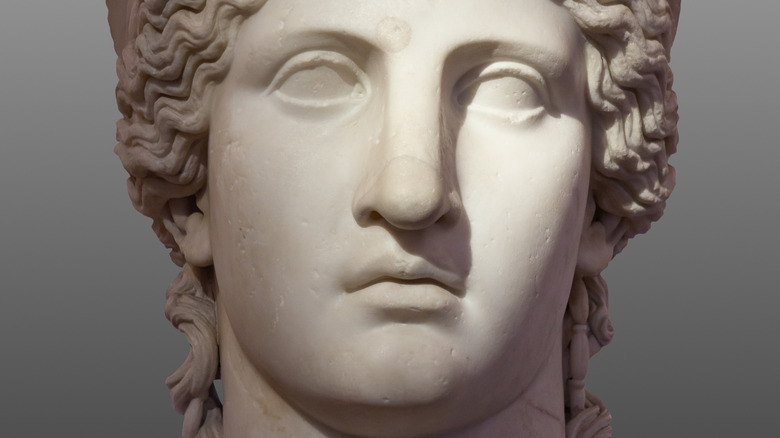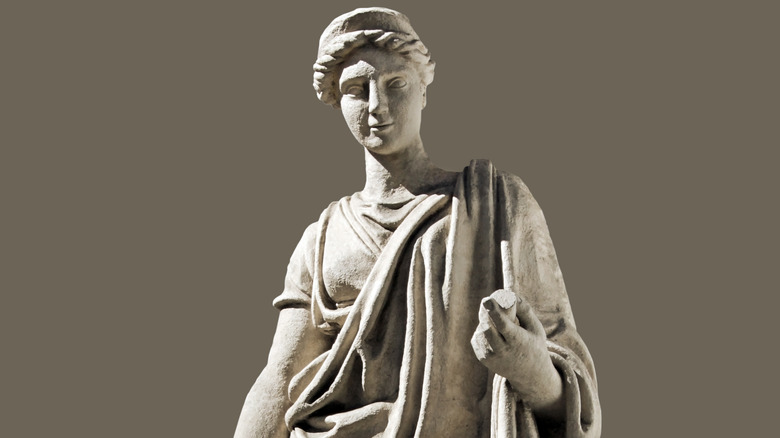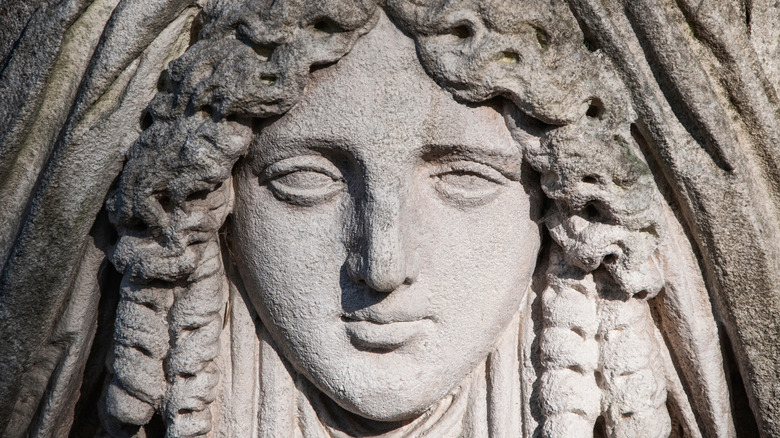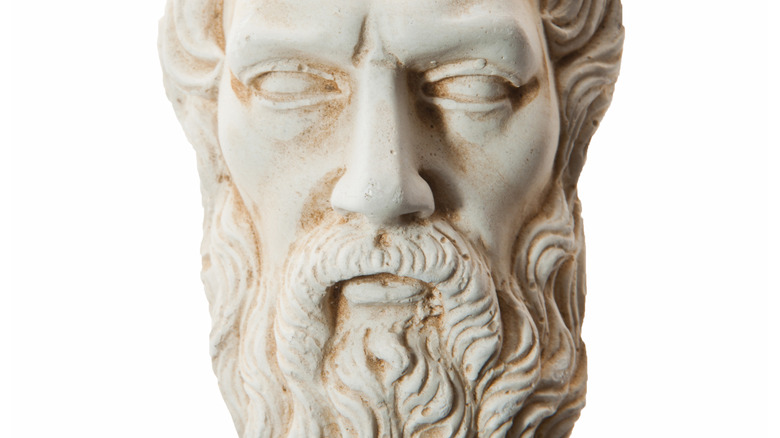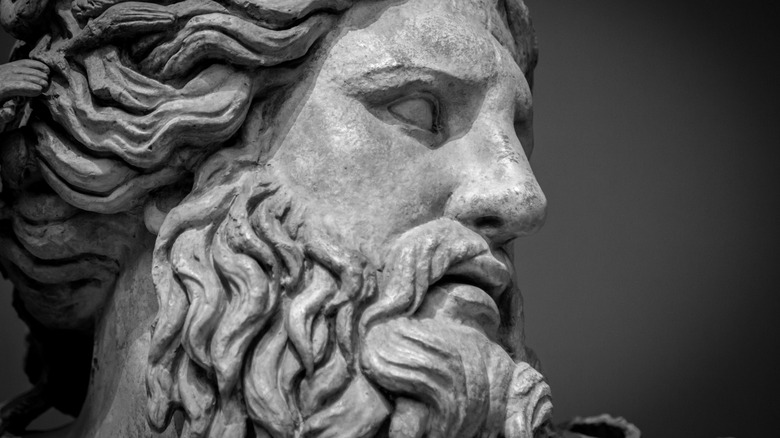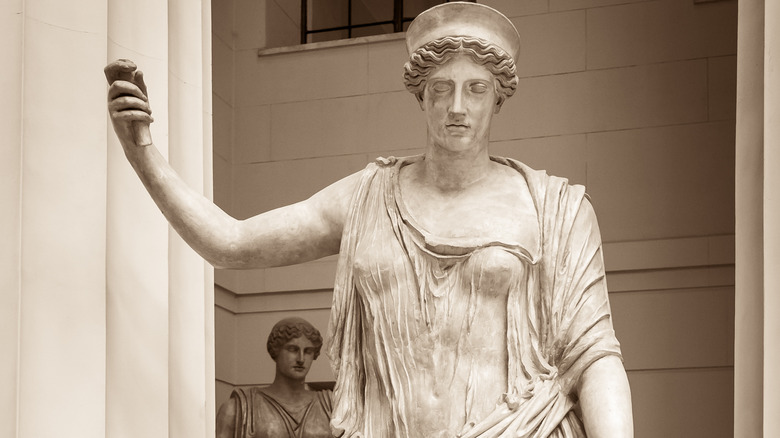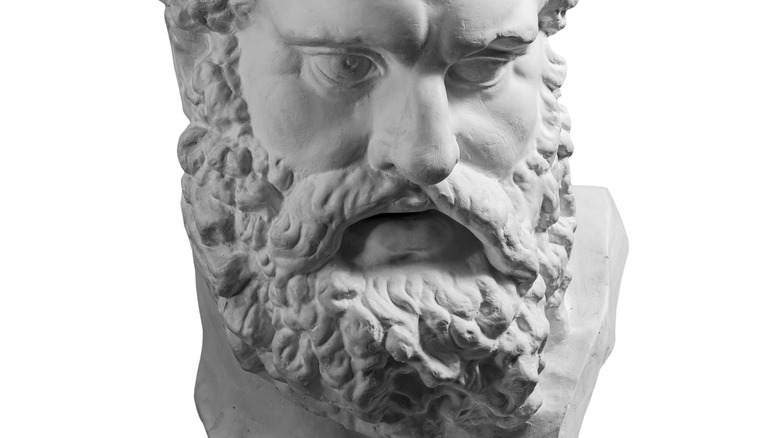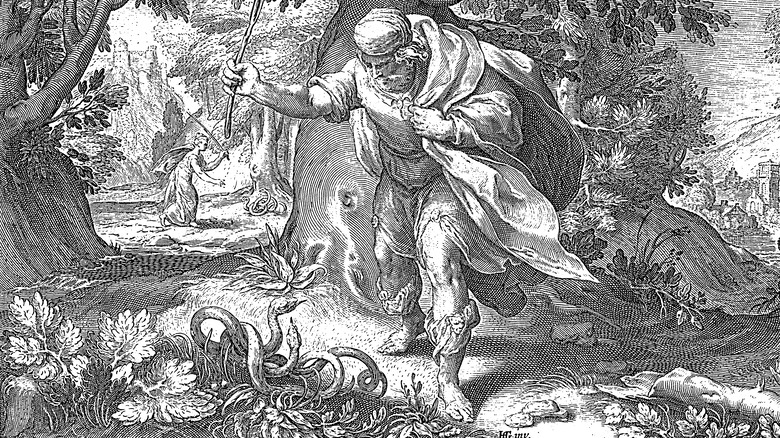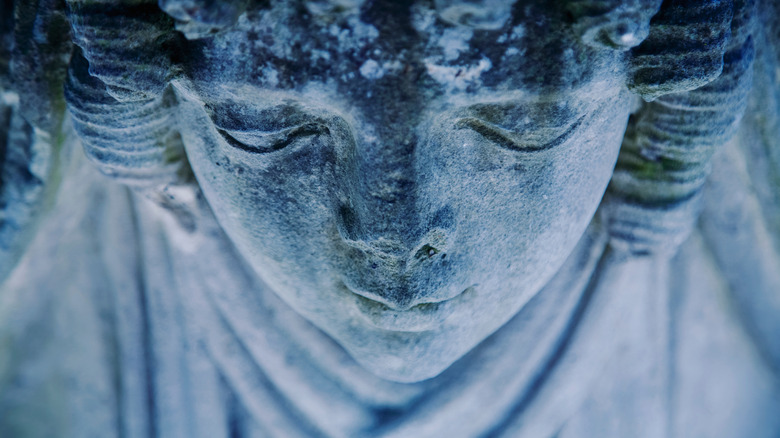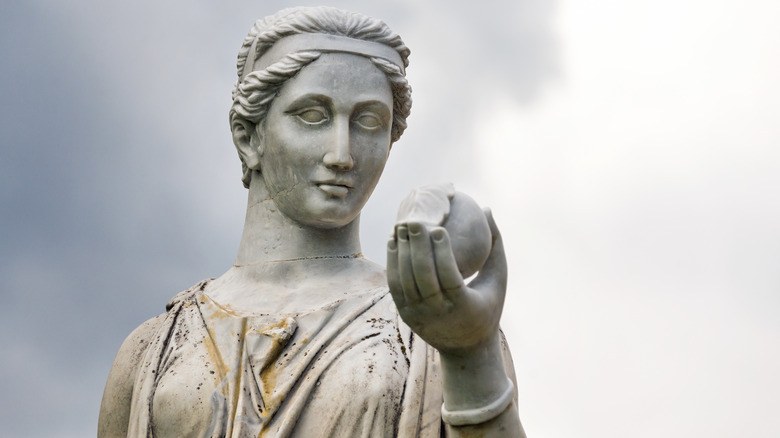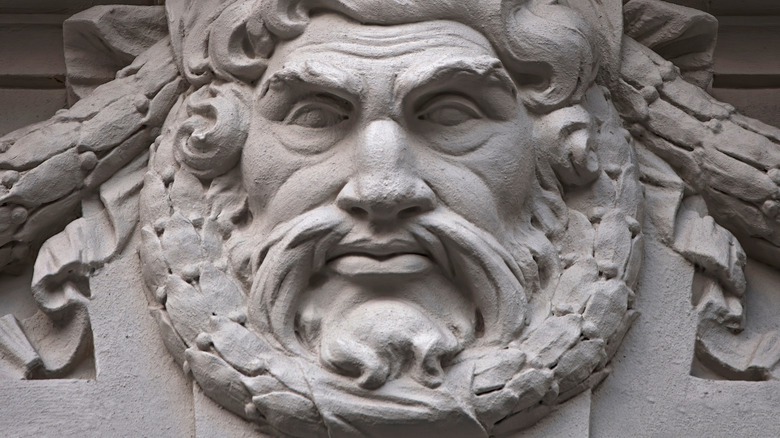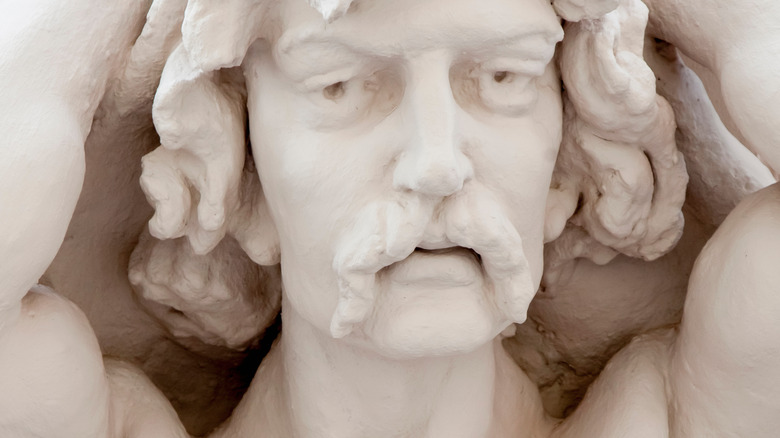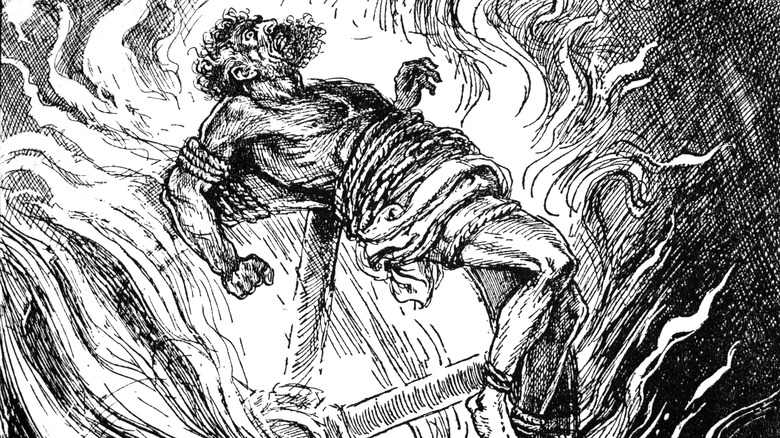The Mythology Of Hera Explained
In Greek mythology, Hera was the queen of the Olympian gods and the wife of Zeus, the king of the gods. Even though she was the goddess of marriage, her own marriage was far from perfect. Hera had to cope with Zeus' numerous affairs, which turned her into an angry, jealous, and vengeful goddess. She had a terrible temper, and she lashed out at those who crossed her. While she was a beautiful deity, she was also merciless, which made her less attractive, according to Greek Gods and Goddesses.
There are many myths involving Hera, including several that involve Zeus' infidelities. For the most part, Hera took her anger out on the objects of her husband's obsession in a take-no-prisoners type of way. She also cursed his lovers' children, proving that no one escaped her wrath. Hera will forever be remembered for her relationship with Zeus, her terrible temper, and her involvement in the Trojan War.
Hera was the Olympian queen of the gods
While her husband Zeus was king of the gods, Hera was queen of the gods. She was the goddess of marriage, women, the sky, and the stars, and she was also the deity of family and children. She presided over marriages and births. Most paintings and sculptures depict Hera as an attractive woman with a crown, wreath, or veil on her head. She is often pictured holding a scepter and is occasionally featured alongside a cuckoo, hawk, or lion, according to Theoi Greek Mythology.
While her name is Hera, this is, in fact, a word that translates to "lady" or "mistress" and isn't a typical name, according to GreekMythology.com. The Roman name for Hera is Juno, which is related to the month of June, one of the year's most popular times to get married, both back then and in modern times. Greek poet Homer often described Hera as "cow-eyed" and "white-armed." She has also been referred to as a virgin because she allegedly renewed her virginity annually by taking a dip in a spring. Her sacred animal was the peacock, according to Greek Gods & Goddesses.
Hera was eaten by her father
Hera's parents were the Titans Rhea and Cronos, and she was born after her two older sisters, Hestia and Demeter, according to GreekMythology.com. Hera's younger brothers were Hades, Poseidon, and Zeus. Cronos ate Hera and all of her siblings except for Zeus at birth. The reason why he ate his offspring is because a prophecy stated that one of his kids would overthrow him, and he didn't want that to happen.
Cronus later regurgitated his children, and they were reborn. Some myths refer to Hera as the couple's oldest child because Cronus vomited his kids in the opposite order in which he swallowed them. The six siblings banded together and, during the war known as the Titanomachy, eventually overthrew him. Hera later married her brother Zeus, and the couple had four children: Ares (the god of war), Eileithyia (the goddess of childbirth), Hebe (the goddess of eternal youth), and Hephaestus, the god of fire.
Hera was tricked by Zeus into becoming his wife
Zeus was known for being a philanderer, but he wanted a wife, so he chose his sister Hera to become his queen and rule alongside him on Mount Olympus. The problem was that Hera had no interest in tying the knot with her brother. No matter how many times Zeus asked for her hand in marriage, she turned him down. This went on for centuries, according to Greek Boston. Zeus refused to give up, however. He concocted a plan that would work in his favor and make Hera his partner forever.
Zeus decided to turn himself into a defenseless bird in need of help. When Hera came upon the animal, she decided to take care of it and give it shelter. Then Zeus revealed his true self, and Hera fell in love with him and agreed to be his wife. The couple had a huge wedding that was attended by all the gods and goddesses. But their marriage wasn't a happy one because Zeus was unfaithful and spent a lot of time with other women. Zeus had dalliances with numerous women, such as Calisto, Danae, Alcmena, Leda, and Europa, as well a young boy named Ganymede.
Hera slyly organized a revolt against Zeus
Hera had a temper and was very jealous of Zeus' relationships with other women, which included other goddesses, nymphs, and humans. Whenever she discovered her husband was sleeping with someone new, she would often punish his lover as well as any children the couple produced, according to Greek Boston. In addition, Hera never let go of the fact that Zeus had tricked her into marriage. So, she decided to take revenge upon her husband.
One day, Hera convinced the other Olympian gods to stage an uprising against Zeus, according to Spiffy Entertainment. They tied Zeus to a couch while he was sleeping. However, they argued about what to do next, wasting time. Zeus' ex-bodyguard Briareus became aware of the situation and freed the king of the gods from his restraints. Zeus found his thunderbolt and forced the other Olympians to bend to his will. When he learned Hera was the ringleader, he hanged her from the sky in golden chains. She cried in agony throughout the night, keeping Zeus from sleeping. He then released her on the condition that she would never again revolt against him. While Hera kept her promise, that didn't stop her from interfering in Zeus' affairs.
She tricked one of Zeus' lovers, Semele, who burst into flames
One of the women that Zeus fell in love with was princess Semele, the daughter of Cadmus, the king of Phoenicia. Hera was very jealous and hated any object of Zeus' affection, so she came up with a plan to take Semele down, according to Ancient-Greece.org. Hera disguised herself as Semele's nurse and convinced her to ask Zeus to visit her in his true form. Hera knew that if Zeus revealed his full power and glory to the mortal woman, it would kill her. However, Semele was unaware of this fact and took Hera's advice.
The next time Semele saw Zeus, she begged him to grant her a favor. He'd made an irrevocable oath on the River Styx to do as she asked, so he showed himself as the powerful and majestic king of the gods, complete with thunder and lightning. Upon gazing upon her lover, Semele was incinerated.
Semele was pregnant at the time, and Zeus saved the fetus by implanting it in his thigh, according to GreekMythology.com. The god Dionysus was born a few months afterwards. Dionysus then rescued his mother from the Underworld and took her to Mount Olympus, where she turned into the goddess Thyone.
She despised Hercules and caused him to murder his entire family
Hercules was the son of Zeus and the mortal woman Alcmene. His mother named him Herakles, which the Romans pronounced as "Hercules," according to the Perseus Digital Library. "Herakles" translates into "glorious gift of Hera," which infuriated the goddess. She tried to kill Hercules by putting snakes in his crib, but baby Hercules killed them with his bare hands. That's when Hera decided that she was going to make Hercules' life a living hell. For example, after he married a woman named Megara, they had two children. Hercules ended up going mad due to Hera's interference and slaughtered his wife and kids.
Hercules asked Apollo for his help. The god told Hercules that the way to remove the stain of impurity from his life was to perform 10 heroic labors, which would later increase to 12. Apollo told Hercules he would turn immortal after he finished the gargantuan task. Naturally, Hera did everything she could to make it difficult for Hercules to complete the 12 labors. He accomplished the tasks, but Hera did not relent and kept interfering. Eventually, Hercules tried to win her over. He even offered a sacrifice to her when she left him alone during an altercation with Hippocoon. By the time Hercules died and went to Mount Olympus, Hera had calmed down. He ended up marrying her daughter, Hebe.
She cursed Tiresias by transforming him into a woman
Tiresias was a blind prophet, seer, and a mediator who resolved conflicts between the gods and humans. One day, Tiresias was on Mount Cyllene in the Peloponnese when he spotted two mating snakes. For some reason, he hit the reptiles with his stick. This behavior upset Hera, so she cursed him by turning him into a woman, according to Tiresias Duo. Tiresias eventually became one of the goddess' priestesses, and she married and had children. Some myths claim Tiresias became a famous sex worker.
Tiresias continued to live as a woman for seven years. She once again found two snakes mating, but this time she left them alone. By controlling her behavior, Tiresias was able to reverse the curse, and she became a man again.
In a related myth, Hera and Zeus asked Tiresias if he could tell them whether men or women enjoyed sex more. They felt he was qualified to answer because he had lived as both a man and a woman, according to the Encyclopedia of Myths. Tiresias replied that men provide more pleasure than they get, which angered Hera, so she blinded him. In response, Zeus gave Tiresias a gift: He could now see the future.
She murdered the children of Zeus' lover Lamia
Libyan queen Lamia was another one of Zeus' lovers. Naturally, Hera was jealous about the relationship, so she decided to exact the ultimate revenge by murdering every one of Lamia's children. Even worse, Hera also made Lamia kill her own offspring, according to GreekMythology.com. It didn't matter if Zeus was the father or not; Hera made sure each one of Lamia's kids died after birth. Understandably, this drove Lamia mad. She became envious of other women's families and started kidnapping infants and taking them to her cave.
No, Lamia didn't raise these children as her own. She ate them. Her behavior became beastly, and as such, her face started to change so that she resembled an animal more than a human being. In some myths, Zeus tried to stop Lamia by making her eyes removable. She kept them in a jar during the day, but at night she put them back in to find more newborns to eat. Other myths claim Zeus gave Lamia the gift of removable eyes so she could sleep because Hera had made her an insomniac.
Over time, Lamia's story became well-known among ancient Greeks, and she was turned into a bogeyman in order to scare children who misbehaved. Other myths say she became a succubus who seduced men and drank their blood while they were sleeping.
She helped determine the end of the Trojan War
One day Eris, the goddess of quarrel, got mad because she wasn't invited to the wedding of King Pileus and the sea fairy Thetis. Eris went anyway, causing trouble by throwing a golden apple on a table during the feast, labeled "to the fairest one." Hera, Athena, and Aphrodite all fought over the apple, believing they were the most beautiful. Rather than get mixed up in the squabble, Zeus told Paris, the prince of Troy, to choose the winner, according to Greek TravelTellers. Each of the goddesses bribed Paris in order to win his favor. Even though Hera said she'd make Paris the king of Europe and Asia, Aphrodite offered to give him the most beautiful woman on Earth (Helen of Troy). Aphrodite won.
Unfortunately, Paris' choice and his dalliance with Helen led to the Trojan War. Hera never forgot what Paris did to her, so she took the Greeks' side during the war, while Zeus supported the Trojans. Hera distracted her husband as much as possible and did whatever she could to help the Greeks win, according to Learnodo Newtonic. She also interfered when her son Ares, the god of war, was fighting on the battlefield alongside the Trojans. Hera's actions, both indirect and direct, helped the Greeks win the war. And this was all because Paris chose Aphrodite over her in a beauty contest.
She punished Zeus' lover, Io, and kept her trapped in the form of a cow
Zeus also fell in love with princess Io of Argos. Knowing that Hera wouldn't be happy with the relationship, Zeus covered the sky with clouds. However, this just made Hera curious, so she left Mount Olympus and broke up the clouds, according to GreekMythology.com. Zeus decided to change Io from a pretty maiden into a white heifer in order to hide the affair. When Hera spotted her husband with the cow, he claimed he knew nothing about it. But Hera was not a fool, so she pretended she liked the animal so much she wanted it for herself. Zeus relented in order to keep his secret.
Hera kept the cow and put Argus, who had 100 eyes, in charge of watching it. Zeus then asked Hermes to intervene by killing Argus. Io earned her freedom, but Hera sent gadflies to torment her, and Argus' ghost also harassed her. This nearly caused Io to go mad, and she wandered around Earth for many years. Eventually, Zeus changed her back into a human, and one of her descendants ended up being Herakles.
She threw her deformed son, Hephaestus, off of Mount Olympus
Hera was not like a typical mother who loved her children regardless of their appearance or abilities. When Hera gave birth to her and Zeus' son Hephaestus, she threw him off Mount Olympus because he was ugly. She was ashamed by the way that he looked, so her solution was to get rid of him. Instead of pitying himself, however, Hephaestus decided to get revenge against his mother.
He built a golden throne and gave it to her as a gift, according to Greek-Gods.info. Hera couldn't resist the throne and immediately sat on it without knowing that unbreakable chains were going to wrap around her body and trap her to the seat. The other gods tried to help her escape, but were unable to do anything. They soon realized that only her son could free her. Dionysus, the god of wine, gave Hephaestus some alcohol and persuaded him to go to Mount Olympus, where he would eventually let his mother go. As a reward for freeing Hera, the gods gave Hephaestus a gift: Aphrodite, who became his wife.
After Ixion boasted about sleeping with Hera, Zeus punished him badly
Ixion, the king of the Lapiths, was not a very good man. The gods invited him to dinner at Mount Olympus, but he wasn't exactly a gracious guest. In fact, the king planned on seducing Hera, Zeus' wife, according to World History Encyclopedia. Even though Zeus was known for his dalliances with other women, he did not want his wife hooking up with another man. So, he decided to trick Ixion by creating a cloud that resembled Hera. Ixion was unaware of the trick and made love to the cloud, thinking it was the goddess. (This, um ... pairing ultimately resulted in the creation of a race of centaurs.)
When he returned to Earth, Ixion bragged that he had hooked up with Hera, which angered Zeus. To punish him, Hermes forced Ixion to repeat "benefactors deserve honor" over and over again. Zeus further increased the punishment by tying Ixion to a flaming wheel, which may have been the Sun, that would spin until the end of time.
